360 Virtual tour of Ancient Rome
Highlights
- Explore the Colosseum in 360°
- Witness a naval battle in the Colosseum
- Marvel at the Arch of Constantine
- Take a rest on the steps of the Circus Maximus
- Admire the Temple of Julius Caesar in the Roman Forum
-
Duration 2 to 4 hours
-
Private Tour Experience
-
18 x 360° reconstructions
-
1-hour engaging narration
-
Subtitles in 12 languages
-
Download for offline use
Embark on a virtual journey through time and explore the wonders of Ancient Rome with our 360° virtual tour. Immerse yourself in the glory and grandeur of the Colosseum, the Roman Forum, and the majestic palaces of the ancient city. Witness a thrilling naval battle from a ringside seat in the Colosseum, stand in awe of the Arch of Constantine, and marvel at the intricate decorations of the Temple of Julius Caesar and Trajan's Forum. With 18 historically accurate 360° reconstructions and engaging narration, this tour will transport you back to the golden age of the Roman Empire. Lace up your virtual walking shoes and get ready to discover the secrets of Ancient Rome from the comfort of your own home.
At a Glance
-
2 hours
-
Instant Confirmation
-
Available in Portuguese, Greek, Modern, Japanese, English, French, Hebrew (modern), Spanish; Castilian, Arabic, Hindi, Russian, , Italian
-
Wheelchair accessible
-
Mobile voucher
-
Private Tour
-
Family friendly
Explore Ancient Rome like never before with a 360° virtual tour, offering immersive reconstructions and engaging narration to bring history to life.
Included
-
1-hour of narration by a local, qualified guide
-
Subtitles in 12 languages
-
18 x 360° reconstructions
-
Download for offline use
-
100 images, infographics and plans
-
Maps & street escapes
Excluded
-
Transportation
-
Entrance fees
Meeting Point
Start your self-guided tour from the marble seats outside the Colosseum.
Piazza del Colosseo, 58, 00184 Roma RM , Italy
End Point
Finish your journey looking at the largest forum of Rome.
Rome, Metropolitan City of Rome Capital , Italy
What to expect
Arch of Constantine

Admire at the Arch of Constantine. Our detailed reconstruction will show you the intricate decorations which commemorate Constantine's accession to the throne.
Arch of Constantine

The Street South of the Arch. The Via Sacra was the processional route followed during a triumph, passing by the great monuments of Rome. The Colossus of Sol, originally of Nero, was one of the striking features along the route, as part of the Emperor's campaign to associate himself inextricably with Rome's past and Sol himself.
Stadium of Domitian
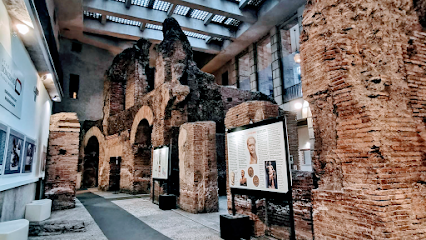
The private garden of the palace, the stadium of Domitian served as a lush, secluded space for the emperor. Similar in shape to a Roman circus, this was the perfect place to ruminate on the expansion of your empire, or recite love poems.

Overlooking the Circus Maximus. In this reconstruction one can imagine the Emperor leaning against the marble balustrade, looking over the cheering crowds and the racetrack of the Circus Maximus at dusk.

The most impressive venue for games, the Circus Maximus exceeded all other Roman circuses in length, width, and capacity. Note the variety of monuments placed in course's center and the implicit message of Rome's dominion indicated by their presence.

A View Over the Roman Forum. Here, from the porch of one of the Palatine hill imperial complexes, you can take in a sweeping view of the Roman Forum. Unlike today, much of the forum was obscured from view by the many monumental buildings that crowded one of the most important places in Rome.
Via Sacra
The via Sacra. The Basilica of Maxentius is the centerpiece of Maxentius' building program following a fire that destroyed many buildings on the west of the forum. After Maxentius' death, Constantine rededicated the basilica to himself, and re-sculpted the colossal statue within to match his own appearance.
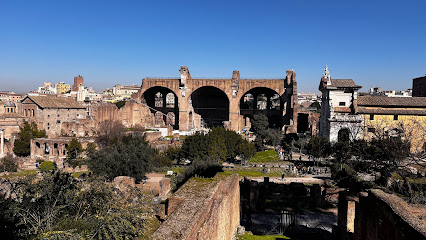
In the Basilica of Maxentius. The ornate interior of the Basilica of Maxentius is a testament to the splendour of Roman decoration. The colossal statue of Constantine, in bronze and marble, is believed to have first depicted Constantine's rival and predecessor, Maxentius, before Constantine had it re-sculpted in hid own image.

The Temple of Peace. Vespasian's Temple of Peace was a repudiation of his predecessor Nero's legacy made in stone. While Nero scoured the empire for the finest artworks to add to his private collection, Vespasian would relocate these prized masterpieces to a place of peace and learning for all Romans.
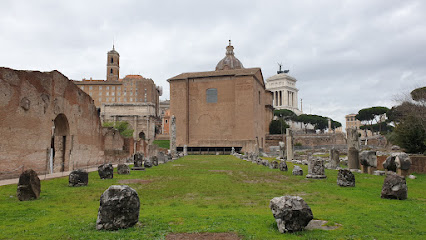
The Basilica Aemilia. The Basilica Aemilia was constructed under the patronage of Lucius Aemilius Lepidus Paullus, brother of the triumvir Marcus Lepidus, and supporter of Julius Caesar. Along the attic were colossal statues of Parthian prisoners, the heavily damaged remains of which are today stored for preservation.
Temple of Divus Julius
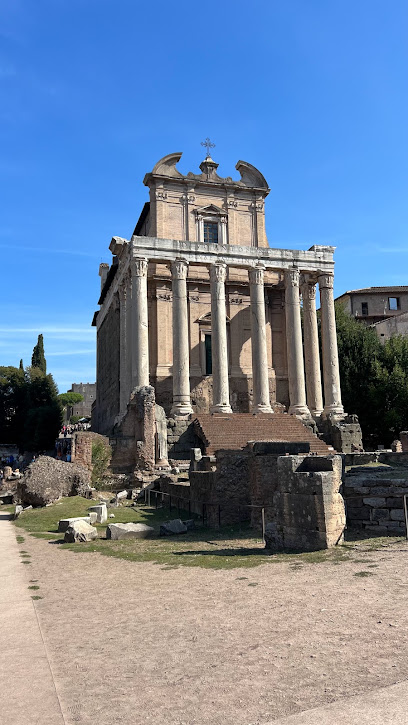
The Temple of Divine Caesar was constructed by Augustus who honoured his adoptive father with apotheosis. The Roman historian Suetonius reported that four months after Caesar's assassination, a comet burned brightly for seven consecutive days, and was revered as the soul of Caesar entering heaven.

Here can be seen monuments to two faces of Roman culture: the ancient religious order of the Vestal Virgins, keepers of the fire of Vesta; and the Triumphal Arch of the Parthians, a monument to the glory of Roman conquest, and expansion of its eastern territories.
Trajan's Forum
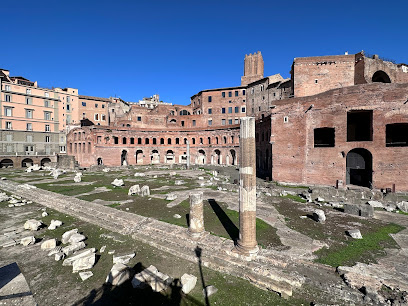
The forum of the Emperor Trajan celebrated this emperor's successful reconquest and suppression of Dacia. The loot from the campaign was used to fund propaganda, with coloured marble statues of the captured Dacian prisoners lining the central court, and with a statue of the triumphant emperor.
The experience can be subject to change due to bad weather or unforseen circumstances. We always endeavour to give you the best possible experience.
Additional Information
-
Wheelchair accessible
-
Infants and small children can ride in a pram or stroller
-
Service animals allowed
-
Public transportation options are available nearby
-
Not recommended for participants with spinal injuries
-
Not recommended for pregnant participants
-
Not recommended for participants with poor cardiovascular health
-
Suitable for all physical fitness levels
What our experts say
-
Start at the Colosseum for best views.
-
Bring water; it can get hot outdoors.
-
Visit nearby Trastevere for local cuisine.
-
Check out the Palatine Hill for stunning views.
-
Download the tour for offline access.
More About this Experience
Introduction:
Explore the wonders of Ancient Rome from the comfort of your own home with our 360 Virtual Tour. This immersive experience allows you to step back in time and witness the grandeur of the Colosseum, the magnificence of the Roman Forum, and the opulence of the Emperors and palaces. Unlike any other virtual tour, our 360-degree reconstructions provide a true-to-life experience, allowing you to compare and contrast the ruins with how they looked in their glory days.What to expect:
During this virtual tour, you can expect to spend a total duration of 120 to 240 minutes exploring the most iconic landmarks of Ancient Rome. The self-guided tour starts at the Colosseum, where you can admire the intricate details of the Arch of Constantine. As you follow the route, you'll walk along the Via Sacra, experience the beauty of the Temple of Julius Caesar, and marvel at Trajan's Forum. Each step of the way, you'll be accompanied by engaging narration, enhancing your understanding and appreciation of the historical significance of these ancient sites.Who is this for:
Our 360 Virtual Tour of Ancient Rome is perfect for history enthusiasts, armchair travelers, and anyone who wants to delve into the rich heritage of Rome. Whether you're a student seeking a visual learning experience or a seasoned traveler nostalgic for the sights you've encountered, this tour is designed to captivate and educate. No matter your age or background, if you have an interest in Ancient Rome, this virtual tour is for you.Why book this:
By booking this virtual tour, you'll gain access to a unique experience that combines the convenience of modern technology with the richness of historical knowledge. Our 360-degree reconstructions allow you to immerse yourself in the heart of Ancient Rome, as if you were truly there. The engaging narration provides insights into the historical context and brings the ancient city to life. With 18 historically accurate reconstructions and a 3.5 km walking route, this virtual tour is a comprehensive and educational journey through Rome's ancient past.Good to know:
Before embarking on this virtual tour, it's important to come prepared. We recommend wearing comfortable walking shoes, having a bottle of water, applying sunscreen, and wearing a hat. Walking around Ancient Rome is not only a captivating experience but also a great opportunity to stay active. So, put on your virtual walking shoes and get ready to explore the wonders of Rome.Reviews:
Customers who have experienced our 360 Virtual Tour of Ancient Rome have been thrilled with the level of detail and immersion provided. They praised the accuracy of the reconstructions and how it allowed them to visualize Ancient Rome in its heyday. Many customers felt like they were actually walking the streets of Rome and appreciated the informative narration that accompanied their virtual journey. Overall, they found the tour to be engaging, educational, and a unique way to experience the history of Ancient Rome.Journals from our explorers at this location
This is a popular product and the date you are looking for just sold out. Next available date is





















